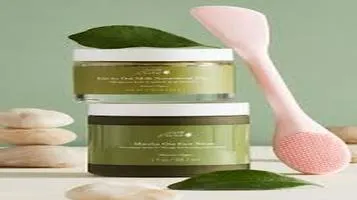Review of Natural and Organic Care Products
Natural and organic care products are crafted using ingredients derived from nature, emphasizing sustainability and environmental consciousness. These products avoid synthetic chemicals, artificial fragrances, and harmful preservatives, opting instead for plant-based ingredients, essential oils, and naturally occurring compounds. The organic label signifies that the ingredients are grown without the use of pesticides or genetically modified organisms, ensuring a purer and more eco-friendly product. Consumers are drawn to these products for their potential benefits, including reduced skin irritation, fewer allergies, and a gentler impact on the body and planet. From skincare and haircare to personal hygiene items, natural and organic care products offer a holistic approach to beauty and wellness, promoting a healthier lifestyle for both individuals and the environment.

In recent years, there has been a remarkable surge in the popularity of natural and organic care products. Consumers are increasingly scrutinizing ingredient lists, becoming more conscientious about what they apply to their bodies, and seeking products that promise not only efficacy but also sustainability and safety. As someone who has extensively explored this burgeoning market, I will provide an in-depth review of natural and organic care products, touching upon their benefits, efficacy, and potential drawbacks.
The Rise of Natural and Organic Care Products
The shift towards natural and organic care products is driven by several factors. Foremost among these is a growing awareness of the potential harm caused by synthetic chemicals commonly found in conventional products. Parabens, sulfates, phthalates, and synthetic fragrances have all been linked to various health issues, ranging from skin irritation to more severe conditions like endocrine disruption and carcinogenicity. Consequently, many consumers are turning to natural and organic alternatives that are perceived to be safer.
Benefits of Natural and Organic Care Products
1. Healthier Ingredients:
Natural and organic products typically avoid harmful chemicals, relying instead on plant-based and naturally derived ingredients. This can be particularly beneficial for individuals with sensitive skin or allergies. For instance, organic skincare products often contain ingredients like aloe vera, chamomile, and jojoba oil, which are known for their soothing and healing properties.
2. Environmental Impact:
Organic farming practices avoid synthetic pesticides and fertilizers, which can be harmful to the environment. By choosing organic products, consumers support agricultural methods that promote biodiversity and soil health, and reduce pollution. Additionally, many natural and organic brands are committed to sustainable packaging solutions, minimizing plastic use and opting for recyclable or biodegradable materials.
3. Cruelty-Free:
A significant number of natural and organic care products are cruelty-free, meaning they are not tested on animals. This aligns with the ethical values of many consumers who advocate for animal rights.
4. Efficacy:
Contrary to the belief that natural products may be less effective, many natural ingredients have been scientifically proven to offer substantial benefits. For instance, tea tree oil is renowned for its antiseptic properties, while shea butter is celebrated for its moisturizing capabilities.
Efficacy and Performance
One of the main concerns with natural and organic care products is their efficacy compared to conventional products. While it is true that some natural products may not offer the same immediate results as their chemical-laden counterparts, many excel in providing long-term benefits without adverse side effects.
For example, organic shampoos may not produce the same rich lather as those containing sulfates, but they cleanse the hair without stripping it of its natural oils. Similarly, natural deodorants might require a transition period before they effectively neutralize body odor, but they do so without exposing the body to potentially harmful aluminum compounds found in traditional antiperspirants.
Moreover, the efficacy of natural products often depends on the quality of the ingredients and the formulation. High-quality brands invest in research and development to ensure their products are not only safe but also effective. It is worth noting that consumers may need to try a few different products to find the ones that work best for their specific needs.
Potential Drawbacks
While natural and organic care products offer numerous benefits, they are not without potential drawbacks:
1. Cost:
Organic and natural products can be more expensive than conventional options. The higher cost is often due to the sourcing of premium ingredients and sustainable practices. However, many consumers find the investment worthwhile for the added health and environmental benefits.
2. Shelf Life:
Without synthetic preservatives, natural products may have a shorter shelf life. This necessitates more frequent purchases and can be inconvenient for some users. Brands often use natural preservatives like vitamin E or rosemary extract, but these may not be as long-lasting as their synthetic counterparts.
3. Availability:
While the market for natural and organic products is growing, they may not be as widely available as conventional products, especially in less urban areas. However, the rise of online shopping has made it easier to access a wide range of natural brands.
4. Effectiveness:
As previously mentioned, some users may find that natural products take longer to deliver results. This can be a deterrent for those looking for quick fixes. It's important to manage expectations and understand that natural products often work in harmony with the body’s natural processes, which can take time.
Conclusion
Natural and organic care products represent a commendable shift towards healthier, more sustainable living. While they may come with higher costs and certain limitations, their benefits to personal health and the environment are compelling. The key to making the most of these products lies in being an informed consumer—researching brands, understanding ingredients, and being patient with results.
As the market continues to evolve and innovate, we can expect even greater advancements in the efficacy and accessibility of natural and organic care products. For those willing to make the switch, the rewards are manifold, paving the way for a healthier lifestyle and a more sustainable planet.






